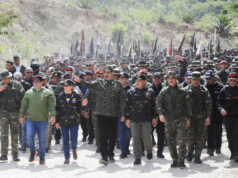Hindus and other minorities are being increasingly targeted by rabid Islamists under the ‘hostile and pro-Jihadist Illegal government” in Bangladesh led by Chief adviser Mohammed Yunus, and the country will soon be declared an Islamic state.
The United Nations and India should therefore consider deploying peacekeeping forces to protect minorities in the country, and establish protected zones in Hindu majority regions for them.
That was the basic argument made by a group of expat Hindus of Bangladeshi origin from the U.S., Canada, and Europe, at a press conference held at the Foreign Correspondents Club of South Asia in New Delhi on December 30.
StratNewsGlobal invited one of the delegates, Dileep Karmakar, a Bangladeshi origin Canadian who fought in the Liberation war of 1971, and a Director of the Toronto-based Global Bengali Hindu Coalition, to a roundtable discussion on the subject.
The two other panelists were Ambassador Pinak Ranjan Chakravarty, who served as Indian High Commissioner to Bangladesh, and Shantanu Mukharji, a security and strategic analyst who’s been studying Bangladesh for over four decades.
Here are the key points from the discussion:
Historical and Contextual Background
- Partition of British India and its consequences are central to understanding the tensions in Bangladesh.
- Born in Pakistan, father in British India, and son in Bangladesh, Karmakar emphasized how partition has impacted generations.
- Land and property confiscation: Hindus’ properties declared as “enemy property,” with extensive land and assets seized.
Religious and Cultural Tensions
- Hindu population in Bangladesh has drastically reduced over time.
- Ongoing Islamization of society and governance, starting from Sheikh Mujibur Rahman’s era, has intensified over the years.
- Allegations of efforts to establish Bangladesh as a 100% Islamic monolithic state by marginalizing or converting minorities.
- Attacks on Hindus, including destruction of vegetarian restaurants and desecration of Indian and Israeli flags, reported.
Political Dynamics and Instability
- Criticism of successive governments for not addressing root issues or fulfilling promises, including Sheikh Mujibur Rahman’s government.
- The rise of external influences and radicalized factions impacting governance.
- Muhammad Yunus’ rapid ascent described as a planned effort amid political instability.
- Awami League under attack, with members killed or forced to flee, weakening their chances in future elections.
- Speculation about BNP and Jamaat’s potential return to power through manipulated electoral processes.
Security and Relations with India
- Anti-India sentiment growing within Bangladesh, manifesting in provocative actions at the border and diplomatic tensions.
- History of harbouring anti-India insurgents and fostering anti-India ideology.
- Cross-border transportation, like trains and buses, halted due to security concerns involving terrorist and gangster activities.
Broader Implications
- Concerns over communal violence framed as politically motivated to downplay their severity.
- Proposal for India to provide a safe haven for Hindus and minorities from Bangladesh, though the feasibility of this idea is questioned.
- Uncertainty surrounding the future political landscape in Bangladesh and the need for elections to stabilize the situation.
Proposed Solutions
- Suggestions include deploying a UN peacekeeping mission to control violence and create a safer environment for minorities, particularly Hindus.
- Call for an autonomous or safe zone for persecuted minorities within Bangladesh.
Minorities Threatened
- Hindus, indigenous people, Buddhists, and even Muslims advocating for secularism face systematic discrimination, violence, and property grabs.
- The government reportedly provides impunity to perpetrators, exacerbating the sense of injustice.
Rohingya Refugee Crisis
- The Rohingya, fleeing persecution in Myanmar, are caught in limbo as Bangladesh struggles to manage the refugee population.
- Efforts to repatriate them face obstacles, including opposition from Myanmar’s Arakan Army and the refugees’ fear of returning.
India-Bangladesh Relations
- India plays a significant role in Bangladesh’s economy, trade, and energy supply.
- Political narratives within Bangladesh often accuse Hindus and pro-India groups of being “agents of India,” complicating bilateral relations.
- The current interim government in Bangladesh lacks coherence, making long-term agreements with India challenging.
Law and Order Breakdown
- The police force and other security agencies are described as ineffective and demoralized, unable to maintain law and order.
- Students and minorities face violence, with the government diverting blame to external influences like the Indian media.
India’s Strategic Options
- With Bangladesh in political disarray, India must tread carefully, engaging with a future elected government for bilateral agreements.
- Immediate concerns include controlling illegal immigration and managing security threats linked to the unstable region.
Role of International Observers
- Proposal for an international team of monitors to ensure unbiased documentation of the situation.
- Acknowledgment that existing accounts of human rights violations and unrest are accurate and not exaggerated.
Political Dynamics
- Bail and dropping of legal cases against BNP Leader Khaleda Zia raise concerns about fairness and political motives.
- Reports suggest her acquittal in certain cases might pave the way for her party’s participation in elections.
- BNP’s eagerness to contest elections is met with skepticism about whether they can campaign freely due to intimidation, coercion, and fear.
- Elections are planned for late 2025 or 2026, but the environment is not conducive to a fair democratic process.
Media Bias
- The press is described as visibly biased and politically influenced, favoring the government narrative.
- Specific incidents, such as naming Indian diplomats as opponents, breach journalistic ethics and exacerbate tensions.
Security and Governance Breakdown
- Senior political and intelligence leaders are in prison, leaving a void in governance and crisis management.
- Released prisoners and stolen weapons heighten the risk of violence and lawlessness.
- Law enforcement agencies are described as ill-prepared to manage potential unrest effectively.
- Criminal elements, freed from incarceration, possess stolen weapons, which pose significant risks to public order.
Future Tense
- The situation remains fluid and unpredictable, with no clear solutions in sight.
- Lack of coordination, leadership, and a coherent roadmap among political actors and security forces creates a grim scenario.
- Calls for resolution hinge on reestablishing order, ensuring fair democratic processes, and addressing internal divisions.
Watch the entire discussion to understand the deepening crisis in Bangladesh, and India’s options as a neighbour with whom it shares a 4,000 km long border goes through some turbulent times.
In a career spanning three decades and counting, Ramananda (Ram to his friends) has been the foreign editor of The Telegraph, Outlook Magazine and the New Indian Express. He helped set up rediff.com’s editorial operations in San Jose and New York, helmed sify.com, and was the founder editor of India.com.
His work has featured in national and international publications like the Al Jazeera Centre for Studies, Global Times and Ashahi Shimbun. But his one constant over all these years, he says, has been the attempt to understand rising India’s place in the world.
He can rustle up a mean salad, his oil-less pepper chicken is to die for, and all it takes is some beer and rhythm and blues to rock his soul.
Talk to him about foreign and strategic affairs, media, South Asia, China, and of course India.




